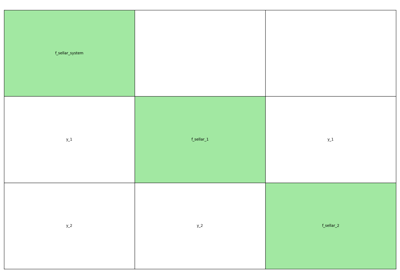auto_py module¶
A discipline interfacing a Python function.
- class gemseo.disciplines.auto_py.AutoDiscDataProcessor(out_names)[source]
Bases:
DataProcessorA data processor forcing input data to float and output data to arrays.
Convert all GEMSEO scalar input data to floats, and convert all discipline output data to NumPy arrays.
Initialize self. See help(type(self)) for accurate signature.
- Parameters:
out_names (Sequence[str]) – The names of the outputs.
- post_process_data(data)[source]
Post-process the output data.
Execute a post-processing of the output data after the
_run()method of the discipline is called, and before they are checked bycheck_output_data().
- pre_process_data(data)[source]
Pre-process the input data.
Execute a pre-processing of input data after they are checked by
check_input_data(), and before the_run()method of the discipline is called.
- one_output: bool
Whether there is a single output.
- out_names: Sequence[str]
The names of the outputs.
- class gemseo.disciplines.auto_py.AutoPyDiscipline(py_func, py_jac=None, name=None, use_arrays=False, grammar_type=GrammarType.JSON)[source]
Bases:
MDODisciplineWrap a Python function into a discipline.
A simplified and straightforward way of integrating a discipline from a Python function.
The Python function can take and return only numbers and NumPy arrays.
The Python function may or may not include default values for input arguments, however, if the resulting
AutoPyDisciplineis going to be placed inside anMDF, aBiLevelformulation or anMDAwith strong couplings, then the Python function must assign default values for its input arguments.Examples
>>> from gemseo.disciplines.auto_py import AutoPyDiscipline >>> from numpy import array >>> def my_function(x=0., y=0.): >>> z1 = x + 2*y >>> z2 = x + 2*y + 1 >>> return z1, z2 >>> >>> discipline = AutoPyDiscipline(my_function) >>> discipline.execute() {'x': array([0.]), 'y': array([0.]), 'z1': array([0.]), 'z2': array([1.])} >>> discipline.execute({"x": array([1.0]), "y": array([-3.2])}) {'x': array([1.]), 'y': array([-3.2]), 'z1': array([-5.4]), 'z2': array([-4.4])}
Initialize self. See help(type(self)) for accurate signature.
- Parameters:
py_func (Callable) – The Python function to compute the outputs from the inputs.
py_jac (Callable | None) – The Python function to compute the Jacobian from the inputs; its output value must be a 2D NumPy array with rows corresponding to the outputs and columns to the inputs.
name (str | None) – The name of the discipline. If
None, use the name of the Python function.use_arrays (bool) –
Whether the function is expected to take arrays as inputs and give outputs as arrays.
By default it is set to False.
grammar_type (MDODiscipline.GrammarType) –
The type of the input and output grammars.
By default it is set to “JSONGrammar”.
- Raises:
TypeError – When
py_funcis not callable.
- cache: AbstractCache | None
The cache containing one or several executions of the discipline according to the cache policy.
- data_processor: AutoDiscDataProcessor
A data processor forcing input data to float and output data to arrays.
- exec_for_lin: bool
Whether the last execution was due to a linearization.
- input_grammar: BaseGrammar
The input grammar.
- jac: MutableMapping[str, MutableMapping[str, ndarray | csr_array | JacobianOperator]]
The Jacobians of the outputs wrt inputs.
The structure is
{output: {input: matrix}}.
- name: str
The name of the discipline.
- output_grammar: BaseGrammar
The output grammar.
- py_func: Callable
The Python function to compute the outputs from the inputs.
- py_jac: Callable | None
The Python function to compute the Jacobian from the inputs.
- re_exec_policy: ReExecutionPolicy
The policy to re-execute the same discipline.
- residual_variables: dict[str, str]
The output variables mapping to their inputs, to be considered as residuals; they shall be equal to zero.
- run_solves_residuals: bool
Whether the run method shall solve the residuals.
- use_arrays: bool
Whether the function is expected to take arrays as inputs and give outputs as arrays.
- gemseo.disciplines.auto_py.to_arrays_dict(data)[source]
Ensure that the values of a dictionary are NumPy arrays.
Examples using AutoPyDiscipline¶

Compute the Jacobian of a discipline with finite differences


